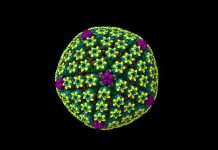A clinical trial for pregnant women at high risk of a low-birth-weight baby has demonstrated that Mediterranean diet or mindfulness-based stress reduction interventions during pregnancy reduce the prevalence of low birth weight by 29-36%.
Low birth weight babies (birth weight below the 10th centile) account for 10% of all births. This is associated with birth complications and health problems such as poorer neurodevelopment in childhood and higher risk of metabolic and cardiovascular health problems in adulthood. WHO recognises this condition as one of the most important causes of perinatal mortality worldwide. Unfortunately, there are no specific evidence-based ways to prevent or improve this condition.
Recently published research demonstrates for the first time that fetal growth can be improved by maternal lifestyle changes. The study demonstrates a reduction of low-birth-weight babies up to 29% and 36% by intervening on the mother’s diet and lowering her stress level.
It has been observed for many years that mothers of low-birth-weight newborns often had a suboptimal diet and high stress levels. This led to designing and conducting a clinical trial to study whether structured interventions based on Mediterranean diet or stress-reduction could reduce fetal growth restriction and other pregnancy complications.
The three-year IMPACT Barcelona study involved more than 1,200 pregnant women at high risk of having a small baby at birth. Pregnant women were randomly divided into three groups: one in which they had visits with a nutritionist in order to follow a Mediterranean diet, a second group in which they followed a mindfulness programme to reduce stress, and a control group with usual monitoring. A follow-up was then conducted to see how the baby was developing and whether there were any complications during pregnancy and delivery.
The dietary intervention was based on methods used in the PREDIMED study, that demonstrated the benefits of a Mediterranean diet to prevent cardiovascular disease, which was endorsed by the American Heart Association. Pregnant women in this group had a monthly visit with a nutritionist to change their dietary patterns and adapt these to a Mediterranean diet, incorporating more fruit and vegetables, white meat, oily fish, dairy products, whole wheat grains and products high in omega-3 and polyphenols. They were therefore given free extra virgin olive oil and walnuts. The researchers measured biomarkers in blood and urine related to the intake of walnuts and olive oil in order to assess objectively if they were adhering to this intervention.
The stress reduction intervention was based on the Mindfulness-Based Stress Reduction (MBSR) programme developed by University of Massachusetts and adapted to pregnancy by the Barcelona researchers. Groups of 20-25 women were formed to follow the pregnancy-adapted programme for eight weeks. Questionnaires were completed at the programme’s beginning and end and levels of stress-related hormones, cortisol and cortisone, were measured in order to identify if any stress reduction had occurred.
The study demonstrated, for the first time, that a Mediterranean diet or mindfulness during pregnancy reduces the percentage of low birth weight and improves complications in pregnancy, such as preeclampsia or perinatal death, when used in a structured, guided manner. The pregnant women in the control group had 21.9% of low birth weight newborns, and this percentage was significantly reduced in the Mediterranean diet (14%) and mindfulness (15.6%) groups.
The researchers are now designing a multicentre study to apply these results to any pregnant woman, without the need to be at risk of having a low weight baby.
The evidence provided by this study (that maternal lifestyle interventions such as a Mediterranean diet and mindfulness can improve fetal growth and reduce neonatal complications) should come handy in designing programmes for Prevention of Small-for-Gestational Age Birth Weights in Newborns Born.
***
Sources:
- Crovetto F., et al 2021. Effects of Mediterranean Diet or Mindfulness-Based Stress Reduction on Prevention of Small-for-Gestational Age Birth Weights in Newborns Born to At-Risk Pregnant Individuals. The IMPACT BCN Randomized Clinical Trial. JAMA. 2021;326(21): 2150-2160.DOI: https://doi.org/10.1001/jama.2021.20178
- Improving Mothers for a Better PrenAtal Care Trial Barcelona (IMPACTBCN) https://clinicaltrials.gov/ct2/show/NCT03166332
***




































